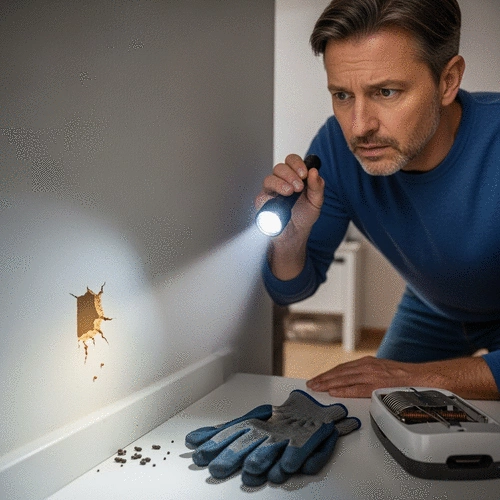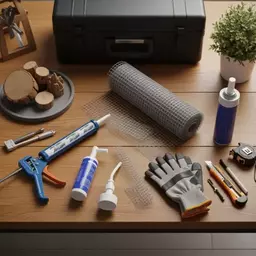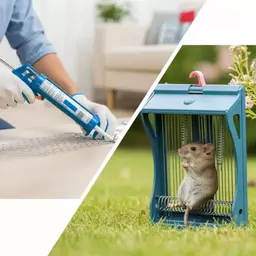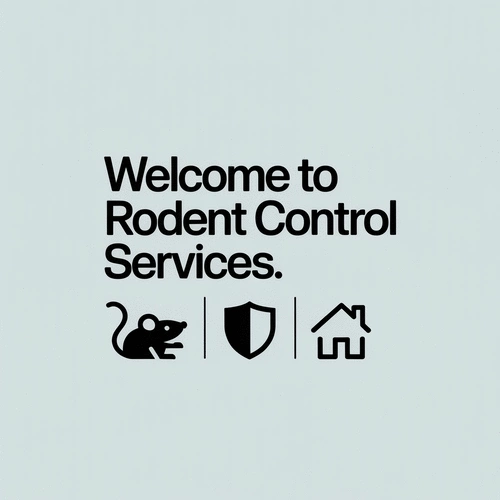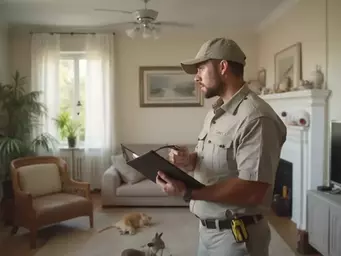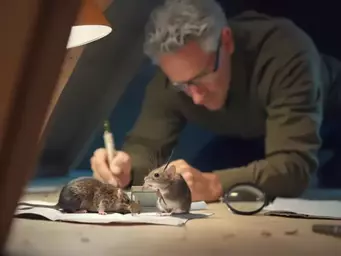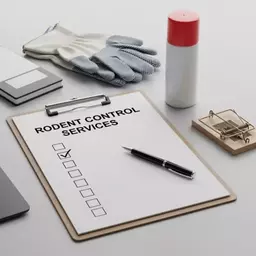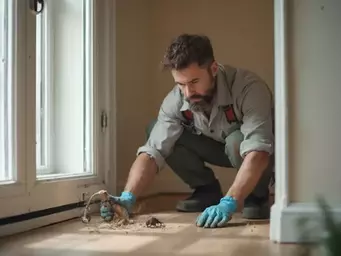Have you ever found yourself hearing strange noises at night, wondering if your home might be sharing space with unwanted guests? Rodents can pose serious health risks and property damage if left unchecked. In this guide, we’ll unravel the essential signs of rodent infestations and unveil the importance of seeking professional help.
What You Will Learn
- How to identify early signs of rodent infestations, including droppings and gnaw marks.
- The potential health risks posed by rodents, such as disease transmission.
- Understanding rodent behavior patterns for more effective detection.
- Steps to take for evaluating and addressing rodent issues in your home.
- When to contact professional rodent removal services for effective intervention.
Understanding the Rodent Infestation Lifecycle
This visual outlines the typical progression of a rodent infestation, from initial signs to the critical need for professional intervention.
1. Initial Signs: Detection
- •Droppings/Urine Stains
- •Gnaw Marks
- •Nightly Noises/Musky Odors
Early vigilance is key.
2. Growing Concerns: Risks
- •Property Damage (Gnawing)
- •Electrical Fire Hazard
- •Disease Transmission
Dangers escalate quickly.
3. Behavior Patterns: Insight
- •Nocturnal Activity
- •Curious Explorers
- •Established Paths
Understanding their habits helps.
4. Taking Action: Resolution
- •DIY Remedies (Initial)
- •Professional Intervention
- •Rodent Proofing
Prompt action ensures safety.
Understanding the Need for Professional Rodent Removal
When it comes to keeping your home or business safe, understanding the signs of rodent infestation is critical. Rodents are not just nuisances; they can cause serious damage and pose health risks. In this section, we'll dive into how to identify these unwelcome guests and why you should consider professional help for rodent removal.
Identifying Signs of Rodent Infestation
Spotting the early signs of a rodent presence can save you time, money, and stress. Here are some common indicators to look for:
- Unusual droppings or urine stains
- Gnaw marks on furniture or walls
- Strange noises, especially at night
- Musky odors in certain areas
By being proactive and recognizing these signs, you're already on the right path to maintaining a rodent-free environment!
Recognizing Rodent Droppings
One of the most telling signs of a rodent infestation is the presence of droppings. Rodent droppings vary in size and shape, depending on the type of rodent. For example, mouse droppings are small and rod-shaped, while rat droppings are larger and more blunt. Finding these droppings in areas like kitchens, basements, or attics signifies that an infestation is likely present. The quantity of droppings can also indicate the level of infestation—more droppings typically mean more rodents! The National Pest Management Association (NPMA) offers further resources on identifying various pest signs.
Detecting Gnawing Damage and Nesting Signs
Rodents have strong teeth that never stop growing, which means they often gnaw on materials to keep them trimmed. Look for gnaw marks on wood, wires, or even plastic. Additionally, you might find nesting materials such as shredded paper, fabric, or insulation. If you're seeing signs of damage or nests in your space, it's time to take action.
Listening for Noises and Noticing Odors
Rodents are more active at night, which is when you're likely to hear them. Listen for scratching sounds in walls or ceilings as they scurry about looking for food. You might also notice a distinct, musky odor, which is a strong indicator of rodent activity. If any of these signs resonate with you, please don't hesitate to reach out to us at Rodent Control Services!
Assessing the Risks of Rodent Infestations
Understanding the risks associated with rodent infestations is vital for making informed decisions. Here are some key dangers to consider:
- Potential property damage due to gnawing
- Electrical fires caused by chewed wiring
- Health hazards from rodent-borne diseases
By addressing rodent issues promptly, you can prevent these risks and keep your property safe.
Property Damage Concerns
Rodents can cause significant damage to your property, chewing through wood, insulation, and even electrical wiring. This can lead to costly repairs and, in some cases, increase the risk of fires. The sooner you identify and eliminate these threats, the better! The NPMA provides extensive information on the types of damage pests can cause.
Health Hazards and Disease Transmission
Rodents are known carriers of various diseases, including hantavirus, leptospirosis, and salmonella. These diseases can pose serious health risks not only to humans but also to pets. It's crucial to take immediate action if you suspect a rodent problem in your space. Your health and safety are paramount!
Understanding Rodent Behavior Patterns
Knowing how rodents behave can help you identify infestations early. Here are a few common behaviors:
- Rodents tend to be most active during the night
- They are highly curious and will explore new areas
- Rodents often return to established paths
By familiarizing yourself with these behaviors, you can keep a watchful eye on potential rodent activity in your home or business. Early detection is key!
Pro Tip
Did you know? Regularly inspecting your property for potential entry points and signs of rodent activity can significantly reduce the chances of an infestation. Consider scheduling seasonal checks to stay one step ahead of these unwelcome guests!
Taking Action: Next Steps for Rodent Issues
Assessing Your Situation and Making an Informed Decision
If you suspect a rodent problem, it's crucial to take a step back and evaluate the situation. I've found that using a checklist can be immensely helpful in identifying signs of infestation. Here’s what to look for:
- Visible droppings in common areas
- Gnaw marks on food packages or furniture
- Unusual scratching or scurrying noises at night
- Signs of nests made from shredded paper or fabric
- Strong, musty odors in enclosed spaces
By going through this checklist, you can pinpoint the severity of the issue. Remember, if you notice even a few of these signs, it’s essential to act promptly! Evaluating your situation honestly allows for a more informed decision on whether to tackle the problem yourself or seek professional help.
Contacting Professional Rodent Removal Services
After assessing your situation, if it seems like a larger issue than you can handle, don’t hesitate to reach out to local experts. At Rodent Control Services, we pride ourselves on being available to assist you whenever you need! Call us if you notice:
- Multiple signs of rodent activity
- Visible damage to property or wiring
- Persistent odors that don't go away
- Unsuccessful DIY remedies
These indicators show that it’s time for professional intervention. Our team can help you get back on track to a rodent-free environment with effective strategies tailored to your specific needs. For tips on hiring a rodent control professional, consult resources from the EPA.
Frequently Asked Questions About Rodent Infestations
Q: What are the earliest signs of a rodent infestation?
A: The earliest signs include unusual droppings or urine stains, gnaw marks on surfaces, strange scratching or scurrying noises (especially at night), and musky odors in affected areas.
Q: What health risks do rodents pose?
A: Rodents can transmit various diseases such as hantavirus, leptospirosis, and salmonella, posing serious health risks to humans and pets alike.
Q: Can rodents cause property damage?
A: Yes, rodents can cause significant property damage by gnawing on wood, insulation, and electrical wiring, which can lead to costly repairs and even increase the risk of electrical fires.
Q: When should I call a professional for rodent removal?
A: You should contact professional services if you notice multiple signs of rodent activity, visible damage to your property or wiring, persistent odors, or if your DIY attempts to control the infestation have been unsuccessful. The EPA provides helpful tips for hiring a professional.
Q: How can I prevent future rodent infestations?
A: Preventing future infestations involves regular inspection of your property for potential entry points, implementing rodent-proofing strategies, and staying informed about rodent behaviors and prevention methods. Proactive seasonal checks are also recommended.
Final Thoughts on Rodent Control
Ensuring a Rodent-Free Environment
Addressing rodent issues promptly is essential for maintaining a safe and healthy space. Timely action paired with effective management strategies—like rodent proofing your property—can make a significant difference. Remember, a proactive approach helps prevent future infestations!
Staying Informed and Prepared
Education is key when it comes to pest management. By staying informed about rodent behaviors and prevention methods, you can avoid potential infestations in the future. Together, let’s work on keeping your home or business rodent-free!
Recap of Key Points
Here is a quick recap of the important points discussed in the article:
- Identify signs of rodent infestation, including droppings, gnaw marks, noises, and odors.
- Understand the risks associated with rodents, such as property damage and health hazards.
- Be proactive by assessing your situation using a checklist to evaluate rodent activity.
- Contact professional rodent removal services if multiple signs indicate a significant infestation.
- Implement rodent-proofing strategies to prevent future infestations and ensure a safe environment.

